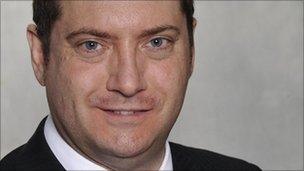Ombudsman for Wales rejects calls for reform of job
- Published
-1.jpg)
Peter Tyndall said he would not want to place a gag on free speech in the council chamber
The watchdog responsible for policing Welsh councillors' conduct has dismissed calls for reform of his role.
The Public Services Ombudsman for Wales claims new guidance has helped reduce the number of cases referred to him.
Peter Tyndall was criticised after a series of high-profile cases including one where a councillor called Scientology "stupid" on Twitter.
Decisions to take no further action have made a "laughing stock" of the role, says Peter Black AM.
The Scientology remark occurred when Cardiff councillor John Dixon used Twitter to post his view as he walked past a Scientology centre in London.
Swansea councillor Rene Kinzett also came in for criticism when he said some members of his authority were "past it".
No further action
Both men were referred to the ombudsman with complaints made under Section 4 of the code of conduct, which requires councillors to show "respect and consideration for others".
In both cases the ombudsman decided the men should go before their council's standards committees, and both of them decided to take no further action.
Liberal Democrat AM Mr Black, who is also a Swansea councillor, told BBC's Eye on Wales he fears that the code of conduct and the ombudsman are being used by individuals to "sanitise debate" within Welsh local government.
He wants to see the whole system reformed.
"What we have at the moment is not fit for purpose. It's actually bringing down the reputation of politics by turning it into petty back-biting and complaints when we should be serving a higher purpose and working on behalf of our constituents," he said.
"It's actually preventing councillors from doing their job of robust scrutiny and holding the administration to account and unless we reform it, it will continue to deteriorate."

Rene Kinzett said the complaint made against him was 'trivial'
Over the last two years the number of code of conduct complaints to the ombudsman has surged by more than 50% - up from 230 in 2007/08 to 352 in 2009/10 - with the most common complaints relating to "equality and respect".
While only a small proportion of complaints are taken on by the ombudsman, the increasing number and their type is of concern to Steve Thomas, chief executive of the Welsh Local Government Association (WLGA).
"The councillors I deal with are not members of 'St Mary of the Meek', they tend to take a view that they are in politics to have a good row, have a good argument, and that's exactly what you would expect," he told Eye on Wales.
"The ombudsman rejects about four fifths of the inquiries that he has because it does get very childish, if gets very pernickety and it can get very vicious. What the code has done is accidentally, partly encourage that."
But Mr Tyndall denies that the way his office operates is potentially damaging debate in council chambers.
"I certainly wouldn't want to form any part of a gag on free speech and I believe that the code doesn't do that," he said.
"But I do accept that there may be a number of councils were the politics are over-heated and that does contribute both to the standards of behaviour and also to the number of complaints.
"In the current year - since we issued guidance on the code of conduct - we've seen a decline in cases - a decline of 20% - which we're very pleased about."
Serious misconduct
Calls for reform of the role come at a time when the Westminster government is looking to do away with the code of conduct for councillors in England.
Instead, serious misconduct by councillors will become a criminal offence to be dealt with by the courts. Councillors will also have to register certain personal interests in a publically available register.
Mr Tyndall is not convinced of the merits of such an approach: "The notion that the police in this straitened times would deal with these issues is one that (only) time will tell in England.
"But my suspicion is that a system of this kind is more effective for dealing with the kinds of behaviour we're talking about."
Reform also does not appear to be on the agenda of the Welsh Assembly Government.
A spokesperson told Eye on Wales: "We have no plans to change the current arrangements in Wales.
"Councillors must comply with a clear code of conduct and if the code is breached, some form of sanction is reasonable."
Eye on Wales is broadcast on BBC Radio Wales at 1300 GMT on Sunday.
- Published11 November 2010
- Published7 November 2010
- Published3 November 2010
- Published1 October 2010
- Published21 July 2010